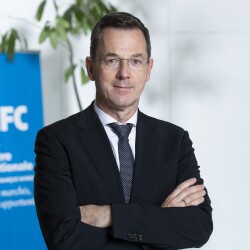Amid global economic uncertainty and the prospect of recession in some key economies, the challenge for most countries of supporting growth at the same time as accelerating their sustainable transition has become even harder.
It is a challenge that is particularly acute across Africa – from the north to the sub-Saharan region – where economic growth is expected to slow sharply this year and into 2023, hampering the ability of countries to finance their transition and protect themselves against climate change.
Importantly, such a position is seen as unjust; Africa contributes less than 4% of global greenhouse gas emissions – the lowest of all continents, according to the UN – yet it is one of the most vulnerable continents to the pernicious effects of rising temperatures.
It’s time for the banking sector and capital markets to mobilise capital into investments that target measurable, positive, social, economic, and environmental impact alongside financial returns

Developed economies have pledged billions of dollars annually to help Africa and other vulnerable developing regions fight climate change, but ahead of that beginning to flow, private sector-led sustainable finance needs to rapidly grow and develop across the continent.
This is where development banks, such as the International Finance Corporation (IFC), are stepping in, helping to develop frameworks and drive collaboration between the public and private sectors to support growth in green and sustainability-linked bonds and loans.
Key to this has been the development and application of the Equator Principles, which are a framework – based on the IFC's Performance Standards on Environmental and Social Sustainability – for financial institutions, to determine, assess and manage environmental and social risks when financing projects.
In short, the adoption of the framework is important for financial institutions, especially in emerging markets, to unlock international finance.
“We worked with governments, industry and the private sector in developing these standards,” says Sérgio Pimenta, IFC’s vice president for Africa. “Over 130 banks and financial institutions, as well as 32 export credit agencies, are now following them.”
Sustainable finance development
Such backing from the financial sector is important, supporting the growth and development of sustainable finance in emerging markets, and especially across Africa.
Indeed, although green bond issuance across Africa is at very early stage, it has taken-off in recent years, thanks in part to IFC’s involvement.
For instance, the development bank supported and invested in Standard Bank’s $200m green bond issue in 2020 – Africa’s largest green corporate bond and South Africa’s first international issue in this format – as well Egypt’s first green corporate bond, and Nedbank’s green residential development bond in 2021, which was the first if its kind in Africa. IFC was also involved in West Africa’s debut green corporate bond – a $18.1m equivalent issued by Côte d’Ivoire real estate group, Emergence Plaza.
While these transactions are important to open-up the green bond market in these countries, its the proceeds of these bonds that can have a direct and more immediate impact, says Pimenta, referencing the Nedbank bond issue.
“South Africa has a deficit of 300,000 homes, and we have a developer who’s ready to build environmentally friendly housing. This project has a strong development angle in that it will involve affordable housing for disadvantaged people, green features such as solar panels and more efficient water treatment, and make a real economic impact.”
Green bonds can and will continue to support transformative change, together with other financing formats that are increasingly in use in Africa such as sustainability-linked loans (SLL).
Such loans incentivise borrowers to support environmentally and socially sustainable economic activity via pre-agreed sustainability-linked targets, which, if hit, lower the interest the borrower pays on the loan.
Earlier this year, IFC provided a $100m 10-years SLL to global mining group, Anglo American, with targets linked to the company achieving specific sustainability goals, including supporting education and livelihoods in communities close to the Anglo’s mining operations in South Africa.
“Sustainability-linked financing is a powerful tool for mobilising capital and to incentivise companies that seek to contribute to a more sustainable future,” says Pimenta.
He adds: “It’s time for the banking sector and capital markets to mobilise capital into investments that target measurable, positive, social, economic, and environmental impact alongside financial returns,” says Pimenta. “The challenge is leveraging the available funding to ensure Africa gets its fair share of economic growth while following green principles.”

